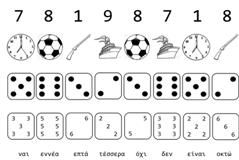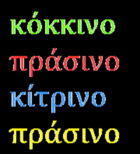
Rapid naming of stimuli: If we present someone with a series of letters, numbers, or other visual stimuli, the time it takes them to name them is a strong predictor of their reading fluency. This is largely due to the simultaneous presentation of the stimuli, because naming individual stimuli (presented one at a time on the screen) has much less correlation with reading. In our studies, we examine the mental programming of processing sequential stimuli. Our goal is to understand the development of reading fluency through behavioral, oculomotor, and neuroimaging studies.

Interference: If we try to name the color in which words that mean another color are written, we see that great difficulty and delay occur, which is called “Stroop interference”. In our studies we examine the relationship of interference with the response to the individual dimensions of the stimulus (word and color), trying to describe the process of naming stimuli and the mental competition when presenting many stimuli simultaneously. Our ultimate goal is to understand the routing of parallel processing of successive stimuli.